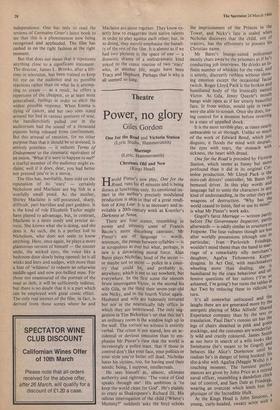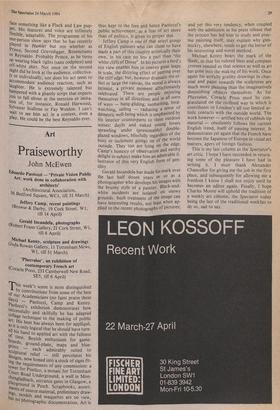Theatre
Power, no glory
Giles Gordon
One for the Road and Victoria Station (Lyric Studio, Hammersmith) Marriage (Lyric, Hammersmith) Chestnuts Old and New (Kings Head)
Harold Pinter's new play, One for the Road, runs for 45 minutes and is being modulated i clitsseelymotional im- pact shown na t the lunchtimes so npl yr e.
production is akin to that of a great rendi- tion of King Lear. It is as necessary and inevitable a 20th-century work as Koestler's Darkness at Noon.
There are four scenes, resembling in power and intensity some of Francis Bacon's more disturbing canvases. Mr Pinter's use of language — words, sentences, the pauses between syllables — is as scrupulous as ever but what, perhaps, is new is a devastating moral force. Alan Bates plays Nicholas, head of the secret or maybe not so secret — police in a coun- try that could be, and probably is, anywhere; which is not to say nowhere, but everywhere. In the first scene the smooth brute interrogates Victor, in the second his wife Gila, in the third their seven-year-old son Nicky, and in the fourth Victor again. Husband and wife are hideously tortured but not in the neurotically tidy office in which they are interviewed. The only sug- gestion in Tim Bickerton's set that this isn't an ordinary room is the window high up in the wall. The torture we witness is entirely verbal. The crime is not stated, less an ac- cidental or devious omission than to em- phasise Mr Pinter's view that the world is increasingly a police state, that if those in control don't like your face, your politics or your style you're better off dead. Nicholas hates his victims, too, for having used their minds; being, I suppose, intellectuals.
He sees himself as, almost, ultimate authority and rightness: 'The voice of God speaks through me'. His ambition is 'to keep the world clean for God'. He's plainly as crazy as Shakespeare's Richard III. His odious interrogation of the child ('Where's Mummy?' suddenly asks the boy) echoes the imprisonment of the Princes in the Tower, and Nicky's fate is sealed when Nicholas discovers that the child, son of traitors, has the effrontery to possess his Christian name.
Mr Bates's lounge-suited policeman
mostly chats away to the prisoners as if he's conducting job interviews. He drinks an in- finite number of whiskies for the road, and is utterly, discreetly ruthless without show- ing emotion except the occasional facial twitch. Roger Lloyd, Pack is the broken and humiliated body of the ironically named Victor. As Gila, Jenny Quayle's mouth hangs wide open as if her utterly beautiful face, lit from within, would split in twain were she able to scream. Once she does, los- ing control for a moment before reverting to a state of appalled shock.
It is the most terrible play, at times nearlY
unbearable to sit through. Unlike so much of the work of Edward Bond, which just disgusts, it floods the mind with despair, the eyes with tears, the stomach with sickness, the heart with dread. One for the Road is preceded by Victoria Station, which seems as funny but more profound than it did in its original Cot" tesloe production. Mr Lloyd Pack is the mini-cab drivers' controller, Mr Bates the bemused driver. In this play words and language fail to unite the characters in any kind of understanding, in the other they are weapons of destruction. 'Why has the world ceased to listen, feel or use its mind? is what Mr Pinter's work asks. Gogol's farce Marriage — written partlY before The Government Inspector, partly afterwards — is oddly similar in structure to Volpone. The four vultures though are less after worldly possessions (though one in particular, Ivan Pavlovich Friedegg, wouldn't mind them) than the hand in Mar- riage of a remarkably silly merchant's daughter, Agafya Tichonovna Kuper" dyagina. In Act One, with matchmakers wheeling more than dealing, she 1,.s humiliated by the crass behaviour and 01- fensive questions of her suitors ('I'm s° ashamed, I'm going') but turns the tables Act Two by reducing them to ridicule in turn.
It's all somewhat unfocused and the
. laughs there are are generated more by the energetic playing of Mike Alfreds' shared Experience company than by the text or translation. Paul Dart's riotous set has the legs of chairs sheathed in pink and green stockings, and the costumes are wonderful- ly wild and crazily coloured. James SM.Ith as our hero in search of a wife looks like, Swinburne (he's meant to be Gogol) and behaves like Alice's Dormouse until he realises he's in danger of being hooked: his
i
tete-a-tete with Agafya (Maggie Wells) s a touching moment. The funniest Perf.°N, mances are given by John Price as a retiretak naval officer, resembling a dandelion clock naval of control, and Sam Dale as Friedegg, wearing an overcoat which lends him the physique of the Incredible Hulk. At the Kings Head is John Sessions, a young, curly-headed, sweaty actor with a face something like a Fluck and Law pup- Pet. His features and voice are infinitely flexible, adaptable. The programme of his one-person show says that he has recently Played in Hamlet but not whether as Prince, Second Gravedigger, Rosencrantz or Reynaldo. Probably Prince, as he turns LIP wearing black tights (sans codpiece) and off-white shirt. Not once on the second night did he look at the audience, collective- ly or individually, nor does his act seem to accommodate audience reaction, such as laughter. He is extremely talented but hampered with a ghastly script that expects you to fall about at the mention or imita- tion of, for instance, Ronald Harwood, Sylvester Stallone or Fay Weldon. I can't wait to see him act in a context, even a Play. He could be the best Reynaldo ever.











































 Previous page
Previous page